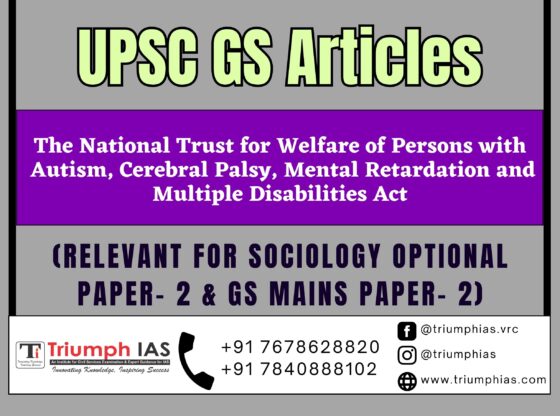The National Trust for Welfare of Persons with Autism, Cerebral Palsy, Mental Retardation and Multiple Disabilities Act
Relevant for sociology optional Paper- 2 & GS Mains Paper- 2

The National Trust for Welfare of Persons with Autism, Cerebral Palsy, Mental Retardation, and Multiple Disabilities Act, also known as the National Trust Act, was enacted in India in 1999 to provide for the welfare of persons with autism, cerebral palsy, mental retardation, and multiple disabilities. The act aims to ensure that these individuals are protected from discrimination and are provided with equal opportunities to participate in society.
The National Trust Act establishes the National Trust for the welfare of persons with autism, cerebral palsy, mental retardation, and multiple disabilities. The National Trust is responsible for implementing the provisions of the act and ensuring that the rights of persons with disabilities are protected. The Trust is governed by a board of trustees, which is appointed by the central government.
The National Trust Act defines a person with disability as someone who has autism, cerebral palsy, mental retardation, or a combination of these conditions. The act recognizes that persons with disabilities have the right to live with dignity and have access to education, employment, and other opportunities. The act also recognizes that persons with disabilities have the right to participate in all aspects of society, including social, cultural, and recreational activities.
The National Trust Act provides for the registration of organizations working for the welfare of persons with disabilities. Organizations that are registered under the act are eligible for financial assistance from the National Trust. The act also provides for the establishment of a National Fund for the welfare of persons with disabilities. The fund is used to provide financial assistance to registered organizations for the welfare of persons with disabilities.
The National Trust Act provides for the appointment of legal guardians for persons with disabilities who are unable to take care of themselves. The legal guardian is responsible for the care and protection of the person with disability. The act also provides for the establishment of local level committees for the welfare of persons with disabilities. These committees are responsible for identifying persons with disabilities in their area and providing them with assistance.
The National Trust Act also provides for the establishment of a grievance redressal mechanism for persons with disabilities. The mechanism is responsible for addressing complaints of discrimination and violation of the rights of persons with disabilities. The mechanism is also responsible for taking action against individuals or organizations that violate the provisions of the act.
The National Trust Act is a comprehensive piece of legislation that aims to provide for the welfare of persons with autism, cerebral palsy, mental retardation, and multiple disabilities. The act recognizes that persons with disabilities have the right to live with dignity and have access to education, employment, and other opportunities. The act also recognizes that persons with disabilities have the right to participate in all aspects of society, including social, cultural, and recreational activities.
The National Trust Act has had a significant impact on the lives of persons with disabilities in India. The act has helped to raise awareness about the rights of persons with disabilities and has led to the establishment of many organizations working for their welfare. The act has also helped to ensure that persons with disabilities are not discriminated against and are provided with equal opportunities to participate in society.
In conclusion, the National Trust for Welfare of Persons with Autism, Cerebral Palsy, Mental Retardation, and Multiple Disabilities Act is an important piece of legislation in India that provides for the welfare of persons with disabilities. The act recognizes that persons with disabilities have the right to live with dignity and have access to education, employment, and other opportunities. The act also recognizes that persons with disabilities have the right to participate in all aspects of society, including social, cultural, and recreational activities. The act has had a significant impact on the lives of persons with disabilities in India and has helped to ensure that they are not discriminated against and are provided with equal opportunities to participate in society.
For more such free UPSC notes, Articles, News & Views Join our Telegram Channel. https://t.me/triumphias
Click the link below to see the details about the UPSC – Civils courses offered by Triumph IAS. https://triumphias.com/pages-all-courses.php


